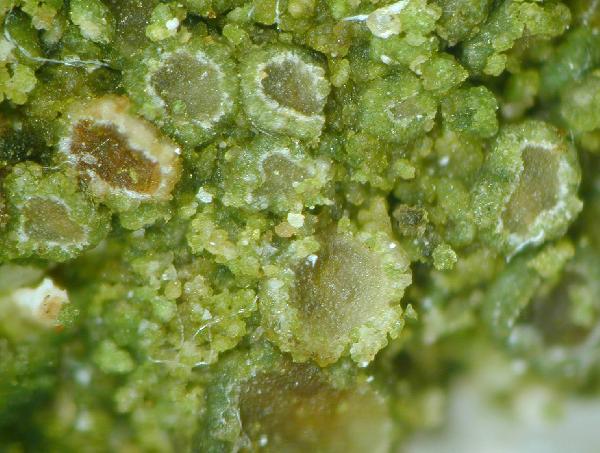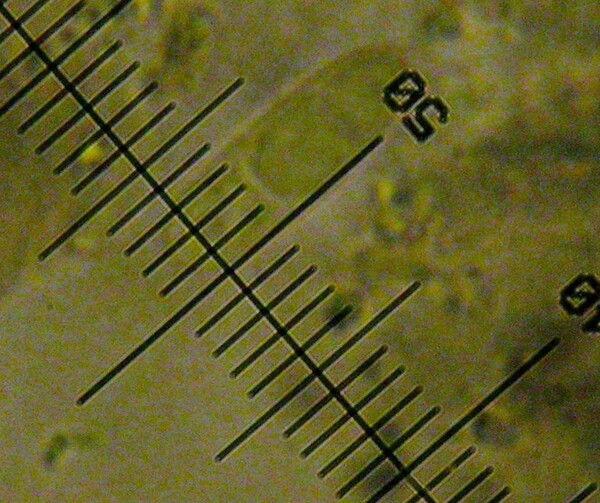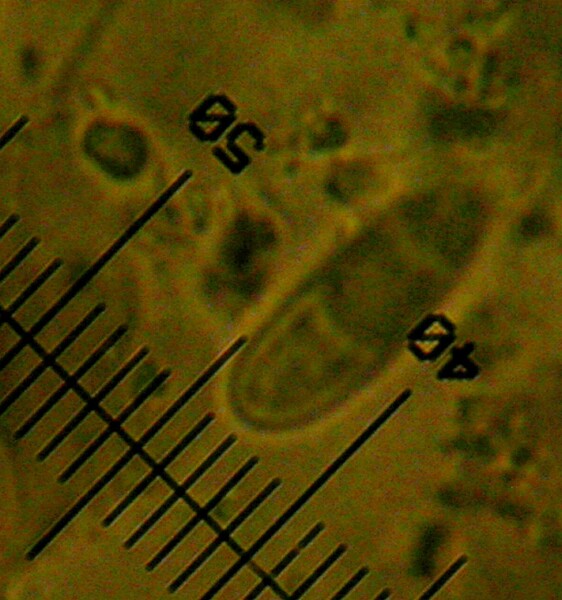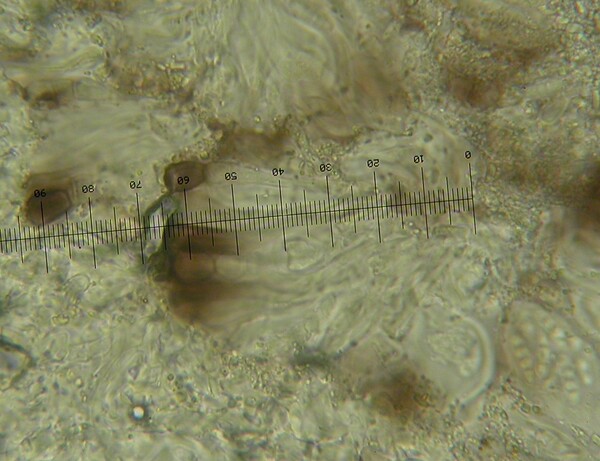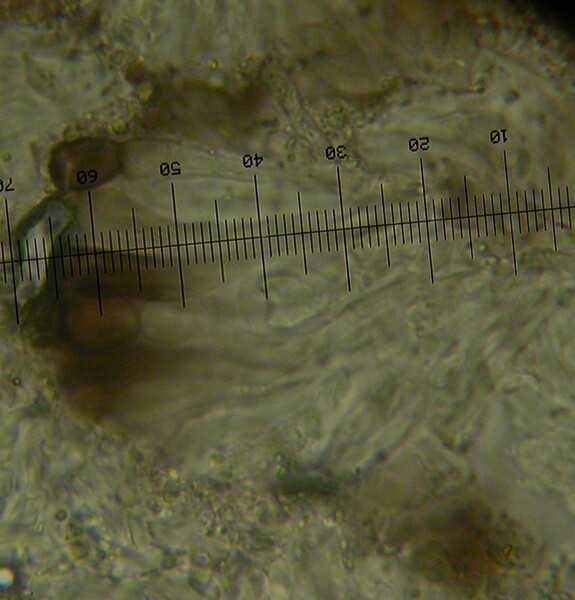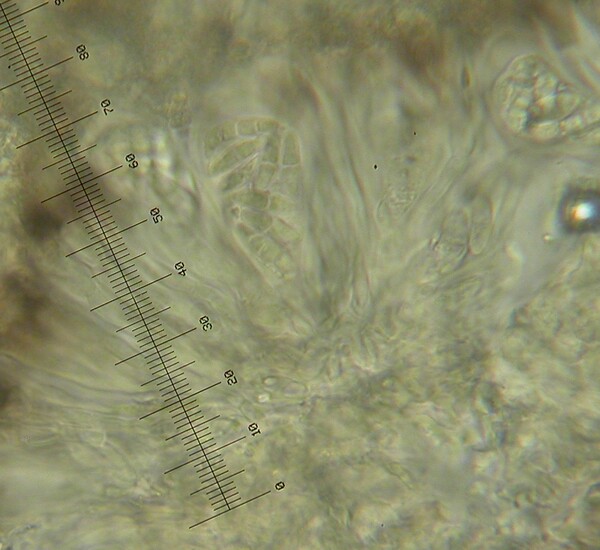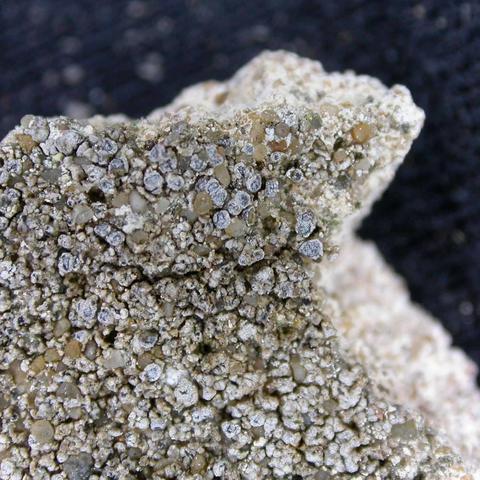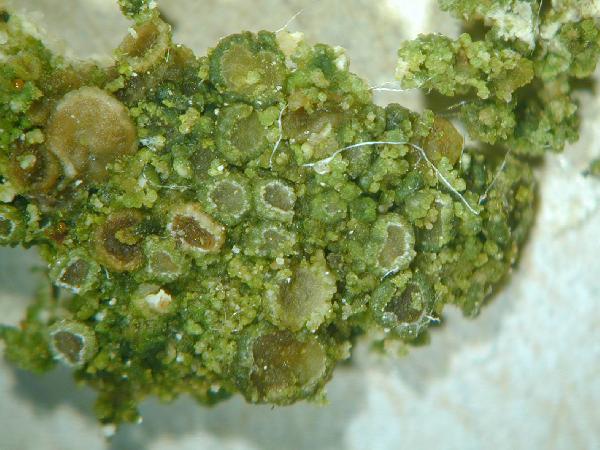Lecania suavis (Müll. Arg.) Mig.
Krypt. Fl. Deutsch., Österr. u. Schweiz, 11: 331, 1926. Basionym: Callopisma suave Müll. Arg. - Flora, 55: 472, 1872.
Synonyms: Lecania tavaresiana Clauzade & Vězda
Description: Thallus crustose, episubstratic, rimose to areolate, yellowish white, reddish brown or dark brown in very exposed sites, the areoles of different sizes on the same thallus, usually convex, sometimes subsquamulose. Apothecia lecanorine, 0.5-1.2 mm across, with a flat to finally convex, orange-brown to brown-black, sometimes grey-pruinose disc, a more or less concolorous, at first rather thick, finally sometimes excluded thalline margin and often a darker pigmented parathecial ring visible between disc and thalline margin. Thalline exciple corticate, the cortex paraplectenchymatous, of isodiametrical cells, best developed in basal parts; proper exciple of dark-pigmented, elongated hyphae; epithecium orange brown to dark brown, the pigment extending into the upper parts of hymenium, with a thin epipsamma; hymenium colourless or brownish, 45-65 μm high; paraphyses strongly capitate, the apical cells 8-10 μm wide; hypothecium colourless. Asci 8-spored, narrowly clavate, with a K/I+ blue tholus and a central non-amyloid area, Bacidia-type. Ascospores 3-septate, hyaline, ellipsoid, (13-)16-20(-22) x (3-)4-4.5 μm, without a gelatinous perispore. Photobiont chlorococcoid. Spot tests: K-, C-, KC-, P-, UV-. Chemistry: without lichen substances.
Growth form: Crustose
Substrata: rocks
Photobiont: green algae other than Trentepohlia
Reproductive strategy: mainly sexual
In underhangs rarely wetted by rain
Commonnes-rarity: (info)
Alpine belt: absent
Subalpine belt: extremely rare
Montane belt: very rare
Dry submediterranean belt: very rare
Humid submediterranean belt: very rare
Padanian area: absent
pH of the substrata:
1 2 3 4 5
Solar irradiation:
1 2 3 4 5
Aridity:
1 2 3 4 5
Eutrophication:
1 2 3 4 5
Poleotolerance:
0 1 2 3
Altitudinal distribution:
1 2 3 4 5 6
Rarity
absent
extremely rare
very rare
rare
rather rare
rather common
common
very common
extremely common
Loading data...
Occurrence data
Predictive map
Growth form: Crustose
Substrata: rocks
Photobiont: green algae other than Trentepohlia
Reproductive strategy: mainly sexual
In underhangs rarely wetted by rain
Commonnes-rarity: (info)
Alpine belt: absent
Subalpine belt: extremely rare
Montane belt: very rare
Dry submediterranean belt: very rare
Humid submediterranean belt: very rare
Padanian area: absent
pH of the substrata:
| 1 | 2 | 3 | 4 | 5 |
Solar irradiation:
| 1 | 2 | 3 | 4 | 5 |
Aridity:
| 1 | 2 | 3 | 4 | 5 |
Eutrophication:
| 1 | 2 | 3 | 4 | 5 |
Poleotolerance:
| 0 | 1 | 2 | 3 |
Altitudinal distribution:
| 1 | 2 | 3 | 4 | 5 | 6 |
Rarity
absent
extremely rare
very rare
rare
rather rare
rather common
common
very common
extremely common
Loading data...
Occurrence data
Predictive map


